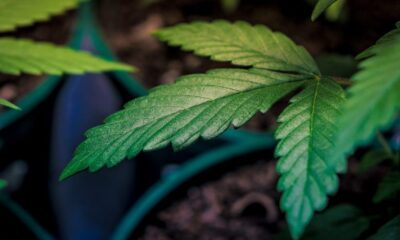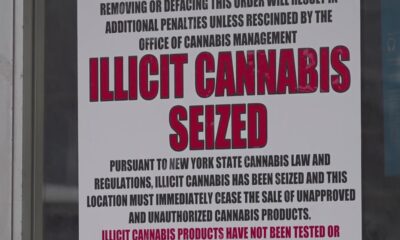featured
Texas Constitution May Bar Lawmakers From Hemp THC Ban in Special Session
Published
2 days agoon

UPDATE: Texas Senate Republicans filed a new bill, Senate Bill 5, to ban the manufacture and sale of products containing hemp-derived THC and other intoxicating cannabinoids, on July 21 in the special session. The legislation, again sponsored by Sen. Charles Perry, R-Lubbock, is nearly identical to Senate Bill 3, which Gov. Greg Abbott vetoed in the regular session. While the bill would ban most cannabinoid hemp products in the Texas marketplace, S.B. 5’s filing says the legislation relates “to the regulation of certain products derived from hemp,” aligning with Abbott’s special session call to “regulate,” not ban, “a lawful agricultural commodity.” The Texas Senate State Affairs Committee is scheduled to hold a special session hearing on S.B. 5 at 9 a.m. CT on July 22 in Austin.
Intoxicating hemp products are back on the chopping block in Texas as the state Legislature reconvened for a special session on July 21 in Austin to tackle 18 issues laid out by Gov. Greg Abbott.
The big question: to regulate or ban?
But whether state legislators can lawfully entertain a broad ban on consumable hemp products containing trace amounts of THC or other intoxicating cannabinoids is up for debate.
According to Article 3, Section 40, of the Texas Constitution, “there shall be no legislation upon subjects other than those designated in the proclamation of the governor calling such session, or presented to them by the governor.”
As it relates to hemp, the only subjects designated by Abbott for this special session deal with legislation to criminalize acts of providing hemp-derived products to children under 21 years old, and to comprehensively regulate hemp-derived products.
That regulation includes limiting potency, restricting synthetically modified compounds, and establishing enforcement mechanisms, “all without banning a lawful agricultural commodity,” as the governor wrote in his July 9 special session proclamation.
While the Texas Constitution may limit state lawmakers from considering a ban in the special session based on the wording of Abbott’s notice, which merely covers the topic of regulation, Lt. Gov. Dan Patrick could double down on his push to ban consumable hemp products with intoxicating compounds.
“It won’t be long before 8,000 smoke and vape shops will be out of business in Texas,” Patrick wrote on X on June 24. “All we have to do is pass S.B. 3, just like we passed during the regular session.”
It’s important to note that while Patrick’s social media post came two days after Abbott vetoed Senate Bill 3, it was well before the governor called the specific subject matters for lawmakers to address in the special session.
Regardless, if the Legislature passes a similar bill to ban hemp in special session, it would go to the governor, who could once again veto or sign it.
During the regular session, Patrick spearheaded S.B. 3’s passage as one of his top priorities. The vetoed legislation had aimed to prohibit manufacturing hemp products containing any amount of a cannabinoid other than nonintoxicating CBD or CBG in what would have been a knock-out blow to an industry that’s had a $10.3 billion economic impact on the state, employing some 50,000 workers, according to Whitney Economics.
While Abbott outlined 18 issues for the Legislature to address, Patrick specifically called out one in the hours leading up to the body reconvening.
“Regulating THC for 21+ in TX is a backdoor way to legalize recreational marijuana,” Patrick wrote Monday morning on X. “Law enforcement is against regulation & supports a full ban. Texas has a robust program for those in need of medical THC for cancer, PTSD, & other issues.”
Furthermore, the lieutenant governor shared an opinion piece that U.S. Sen. Mitch McConnell, R-Ky., wrote July 16 for the Lexington Herald-Leader. Patrick pointed out that McConnell, who spearheaded the federal legalization of hemp in the 2018 Farm Bill, had never intended for intoxicating hemp products to proliferate throughout the U.S. as a result.
Under the 2018 Farm Bill, hemp is defined as containing no more than 0.3% delta-9 THC on a dry-weight basis during a pre-harvest field test. While the federal legislation does regulate finished products, Congress preserved the U.S. Food and Drug Administration’s (FDA) authority to regulate cannabis- and hemp-derived compounds under the Food, Drug and Cosmetic Act (FD&C).
Earlier this month, the Senate Appropriations Committee unanimously approved a fiscal 2026 spending bill that would ban hemp-derived cannabinoid products containing synthetic compounds and/or quantifiable amounts of THC or THCA, or other cannabinoids that have similar effects on humans or animals. As a member of the committee, McConnell said the new language to redefine hemp is necessary to close a “loophole” from 2018.
“My 2018 hemp bill sought to create an agricultural hemp industry, not open the door to the sale of unregulated, intoxicating, lab-made, hemp-derived substances with no safety framework,” McConnell said.
While the 2018 Farm Bill federally legalized hemp by removing it from the Controlled Substances Act, it also provided state autonomy to regulate hemp, and, according to a recent ruling from the U.S. Court of Appeals for the Eighth Circuit, to ban hemp as long as such a ban does not interfere with interstate commerce.
However, being that the Eighth Circuit doesn’t hold jurisdiction in Texas, Abbott and Patrick have collided on the right path forward for the Lone Star State: regulation or prohibition. Specifically, Abbott said in his veto message last month that a ban would take years to implement—similar to the yet-to-be-implemented 2023 ban in Arkansas under the Eighth Circuit—when the issue at hand needs to be dealt with immediately.
“There are … many Texans conducting business responsibly, who invested millions of dollars planting fields or opening up retail stores in reliance on laws making hemp a lawful product to ‘be sold at retail or otherwise introduced into commerce,’” Abbott wrote.
The Texas special session kicked off July 21 with lawmakers tackling Abbott’s call to revise the state’s congressional redistricting plan—a move that could protect Republicans’ slim majority in the U.S. House come the 2026 midterm election. The special session can last for up to 30 days, and it remains unclear how the hemp issue will play out.
While S.B. 3 attracted support from 105 of 108 Republicans across the bicameral Legislature during the regular session, Democratic state Rep. James Talarico accused Patrick of playing a political game to gain that backing. That accusation came on July 18, when Talarico appeared on The Joe Rogan Experience, a popular podcast.
Specifically, Talarico claimed that Patrick blocked House-passed legislation that aimed to establish an emergency response plan for natural disasters like wildfires and floods while also pushing for S.B. 3’s passage in order to protect the alcohol industry.
“[Patrick] held that [House] bill hostage so that he could get his THC ban through,” Talarico told Rogan. “The fact that the lieutenant governor, one, would do the bidding of one industry over the other, two, would hold up literally a lifesaving bill that could have possibly saved lives over the weekend in those floods, just to cater to wealthy special interests, to me, is just an encapsulation of everything that’s wrong with politics.”

Author: mscannabiz.com
MScannaBIZ for all you Mississippi Cannabis News and Information.
You may like
-


Massachusetts Lawmakers Consider Competing Bills Around Boundaries Of Marijuana Advertising
-


Moncton cannabis facility criticizes excise tax
-


Marijuana and the WWE – The Fresh Toast
-


Crackdown on illegal cannabis shops in Buffalo
-


Turkish Parliament Legalizes Low-THC Product Sales in Pharmacies
-


The DEA’s New Boss Holds the Keys to Weed Reform: Will He Take Action?
featured
Massachusetts Lawmakers Consider Competing Bills Around Boundaries Of Marijuana Advertising
Published
8 minutes agoon
July 24, 2025
“Billboards are the one form of marketing where you can’t change the channel, you can’t turn the page, you can’t click away from it.”
By Bhaamati Borkhetaria, CommonWealth Beacon
The Joint Committee on Cannabis Policy heard testimony on Tuesday about an issue that has been bubbling up in the industry: Should cannabis companies be allowed to advertise, run discounts or have sales?
There are currently strict limitations governing how cannabis companies can advertise. Dispensaries are prohibited from advertising in any medium where 85 percent of the target audience is not expected to be 21 or older, and they are not allowed to offer gifts, discounts, sales, points-based rewards or any customer loyalty programs.
The House passed a suite of cannabis legislation in June that did not address advertising. (Senate leadership has yet to weigh in on whether the chamber will be taking up cannabis legislation this session.) House lawmakers have filed five separate bills that would make advertising rules more strict—such as by banning billboard advertisements for cannabis products or changing how fines are imposed for advertising violations—to protect young people. Meanwhile, another bill filed by Sen. Dylan Fernandes (D) of Falmouth—which has strong support from the industry—seeks to loosen restrictions on discounts and promotions to help struggling business owners compete more effectively.
Many in the cannabis industry have advocated for the ability to advertise more widely to level the playing field with multi-state cannabis companies that already advertise because they can afford to pay a fine. The Cannabis Control Commission issued an advisory in May 2024 that said that the agency had learned that some cannabis businesses in Massachusetts have been flouting advertisement regulations.
Cannabis operators also say that they are competing with intoxicating hemp products, which have proliferated across the state because of a federal loophole that defines hemp and cannabis differently. This means that hemp products—even though they contain the same main intoxicating substance—are not bound by the same advertising rules.
“Being able to advertise is how any business attracts new customers,” Nike John, the owner of The Heritage Club dispensary in Boston and one of the inaugural cohort of the Cannabis Control Commission’s social equity program, told CommonWealth Beacon. “Marketing is a function of all businesses.”
The 2016 ballot question that legalized recreational cannabis in Massachusetts proposed similar regulations to those governing alcoholic beverages, but cannabis has faced more stringent restrictions. Liquor stores and breweries are allowed to offer discounts and promotions that they can advertise.
The bill being pushed by the industry would keep the cannabis commission from prohibiting “advertising, marketing and branding of sales, discounts, and customer loyalty programs.”
“Since the industry launched, cannabis businesses have been held to a different standard, one that blocks us from offering basic tools like discounts, promotions or even loyalty programs that every other industry takes for granted,” Phil Smith, owner of Freshly Baked Co. of Taunton, another social equity business owner, told CommonWealth Beacon. “This bill levels the playing field. It gives small social equity businesses like Freshly Baked a real shot at competing, growing and building community relationships the same way liquor stores and breweries do every day.”
Opponents say that cannabis is harmful to children and that advertising can promote youth cannabis use.
“For nearly 10 years, Massachusetts has failed to enact policies that protect public health from the harms of high THC cannabis,” said Amy Turncliff, a neuroscientist and a public health advocate who does therapeutic consulting on addiction disorders. “Prohibiting billboard ads is a simple, effective step.”
David Jernigan, a professor at Boston University’s School of Public Health who has authored a book on cannabis policy, testified in favor of a bill that would ban all billboard advertisements of non-prescription marijuana. In one study of 172 cannabis users between the ages of 15 and 19, he found that adolescents who see cannabis billboards even rarely are five times more likely to develop a cannabis use disorder.
“Billboards are the one form of marketing where you can’t change the channel, you can’t turn the page, you can’t click away from it,” said Jernigan. “If they’re in the environment and you’re young, you’re going to see it.”
The package of cannabis legislation that the House passed would increase purchasing and possession limits for cannabis, double the number of dispensaries one business can own, create an avenue for legal hemp beverages to be sold in liquor stores, restructure the cannabis commission, crack down on hemp-derived intoxicating products, and loosen existing requirements for medical marijuana businesses. The Senate has not indicated whether that chamber will be prioritizing cannabis reform in this session.
“The work before us remains urgent and deeply impactful,” said Sen. Adam Gomez of Springfield, one of the chairs of the cannabis committee. “The cannabis industry in Massachusetts is still young and evolving, and how we shape its future will have lasting consequences for equity, public health, labor rights, and also economic opportunity across the community.”
This article first appeared on CommonWealth Beacon and is republished here under a Creative Commons Attribution-NoDerivatives 4.0 International License.![]()

Author: mscannabiz.com
MScannaBIZ for all you Mississippi Cannabis News and Information.

Hulk Hogan was one of the star at it’s peak, so we wonder about marijuana and WWE
Cannabis has long been a popular—if unofficial—part of professional wrestling culture, and WWE is no exception. For decades, many of the industry’s biggest stars have used marijuana to relax, recover, and cope with the physical and mental toll of the job. By some backstage estimates, up to 90% of WWE talent have used cannabis, whether for stress relief or pain management. WWE reached its peak popularity during two main eras: the Godlen Era of the 1980s, where the late Hulk Hogan was the star and the Attitude Era of the 90s, led by stars like Stone Cold Steve Austin and The Rock. These periods saw unprecedented viewership. But what about marijuana and the WWE?
RELATED: The Connection Between Country Music And Cannabis
The list of cannabis-friendly wrestlers includes major names such as Rob Van Dam, Randy Orton, Jeff Hardy, Matt Riddle, and Sean Waltman. Rob Van Dam in particular has championed marijuana publicly, crediting it with helping him manage pain and stay grounded during his career. Others, like Bret Hart and Val Venis, have expressed similar sentiments.

By 2022, WWE had largely stopped enforcing marijuana fines in practice. And in early 2025, WWE superstar Michin (Mia Yim) confirmed what many suspected: marijuana was officially removed from the company’s banned substance list “a couple of years ago.” This quiet but significant policy shift aligns with widespread legalization and normalization of cannabis use in much of the U.S.
The move has been welcomed by fans and insiders alike. WWE Hall of Famer Booker T called the change overdue, praising marijuana as a safer alternative to opioid-based painkillers, which have had devastating effects in the wrestling world.
RELATED: Dolly Parton Expands Her Food Empire
WWE’s new approach represents a more modern and compassionate vision of athlete wellness. Rather than punishing performers for using a now widely legal substance, the company has turned its focus toward more dangerous or performance-enhancing drugs. The shift gives wrestlers more autonomy over their health while also acknowledging cannabis’s role in long-term recovery.
As WWE continues to evolve in the era of legalized marijuana, its updated Wellness Policy reflects a forward-thinking attitude—one prioritizing performer well-being over outdated stigma.

Author: mscannabiz.com
MScannaBIZ for all you Mississippi Cannabis News and Information.
featured
Turkish Parliament Legalizes Low-THC Product Sales in Pharmacies
Published
2 hours agoon
July 24, 2025
The Turkish Parliament passed legislation on July 20 that will allow licensed pharmacies to sell low-THC products derived from hemp to medical patients with certain conditions.
Although Turkish media outlets referred to the reform as medical cannabis legalization, the new law focuses on expanding the country’s industrial hemp program from cultivation to a full supply chain that includes cannabinoid processing, distribution and sales of nonintoxicating products.
Regardless of whether it’s called cannabis or hemp, access to cannabinoid medicines will be expanding in Turkey, where lawmakers in 2016 approved legislation allowing only for sublingual sprays, like Sativex (nabiximols), a pharmaceutical that can alleviate neurological conditions.
Editor’s note: The 0.3% delta-9 THC threshold to differentiate hemp from cannabis in the U.S. dates back to the Agricultural Marketing Act of 1946; however, the threshold became more widely accepted globally after 1976, when Canadian taxonomist Ernest Small and American botanist Arthur Cronquist published an article in the journal Taxon entitled “A Practical and Natural Taxonomy for Cannabis,” even though they wrote that they “arbitrarily” adopted that concentration level.
RELATED: European Parliament Votes to Bring Hemp THC Level Back to 0.3%
Currently, Turkey permits licensed industrial hemp cultivation in 19 of its 81 provinces, but more regions are expected to adopt cultivation programs under the new law, the Hürriyet Daily News reported. Specifically, Turkey’s industrial hemp production grew from 280 tons in 2020 to more than 1,700 tons in 2024 following a call by President Recep Tayyip Erdoğan for farmers to ramp up the agricultural commodity.
“I am calling out to my nation; let’s start the process to cultivate industrial hemp,” Erdoğan said in early 2019. “We will see that industrial hemp has many different benefits in many different areas.”
Industrial hemp is primarily grown for fiber and grain, as hemp grown for cannabinoids, like THC and CBD, represents a separate market segment.
While Turkey’s Ministry of Agriculture and Forestry will continue to oversee hemp cultivation and harvesting under the country’s recently passed legislation, the Ministry of Health will have the authority to license and regulate hemp processing and pharmacy product sales to medical patients. Also, the Ministry of Health will govern a new electronic track-and-trace system to help ensure compliance and safety.
The Ministry of Health will also determine potential regulations around importing and exporting hemp, Turkish news site Haberler.com reported.
The new law amends Turkey’s “Health-Related Laws and Decree Law No. 663,” allowing for medical patients diagnosed with conditions ranging from chronic pain and epilepsy to cancer, multiple sclerosis, and certain psychological disorders, like post-traumatic stress disorder, to access the low-THC products.
While Turkey is primarily in West Asia, it joins many of its European neighbors, prominently Germany, in adopting more permissive cannabis laws.
RELATED: German Cannabis Market Establishes Foundation for Global Industry Expansion
Turkish Parliament Member Leyla Şahin said the new law aims to enhance Turkey’s competitiveness in a growing global sector, sparking potential economic growth through attracting international pharmaceutical companies, investors and research initiatives, the Hürriyet reported.
Those who violate provisions under Turkey’s new law will be fined twice the sales prices of all products subject to the violation, with increased penalties for subsequent offenses.
Historically, Turkey has had strict drug penalties, including up to five years in prison for possessing cannabis, while those who traffic illicit drugs can face 10-to-20-year sentences, according to the country’s penal code.

Author: mscannabiz.com
MScannaBIZ for all you Mississippi Cannabis News and Information.

Massachusetts Lawmakers Consider Competing Bills Around Boundaries Of Marijuana Advertising

Moncton cannabis facility criticizes excise tax

Marijuana and the WWE – The Fresh Toast

Crackdown on illegal cannabis shops in Buffalo

Turkish Parliament Legalizes Low-THC Product Sales in Pharmacies

The DEA’s New Boss Holds the Keys to Weed Reform: Will He Take Action?

Former Erie Co. Home To Cannabis Growth Site?

New German Medical Cannabis Restrictions Will Harm Patients And Hinder Industry Growth (Op-Ed)

New Survey: 9 in 10 Americans Want Decontaminated Cannabis
Dream Of Working In Weed? This Scholarship Could Make It Happen

Cresco Labs Exiting California Market as Part of ‘Strategic Restructuring’

What to know about growing cannabis in your home

Marijuana Would Be Legalized In Texas Under New Bill Filed For Special Legislative Session

Drug bust finds pounds of cocaine, cannabis at NY residence: Chautauqua Co. Sheriff’s Office

How Alcohol And Cannabis Affect Gut Health

Inside a huge High Street cannabis farm in Huntingdon

LEEF Brands Announces CAD $1 Million Private Placement

One Dose. Two Years. Psilocybin Can Ease Depression In Cancer Patients, New Research Shows

Mississippi AG takes aim at hemp products, including Delta THC | News

Missouri Supreme Court Rules Counties Cannot ‘Stack’ Cannabis Sales Taxes

Mississippi AG takes aim at hemp products, including Delta THC | TN State News

Oregon Officials Issue Ballot Title For Initiative To Legalize Marijuana Social Lounges

Limiting marijuana use in public | FOX 5 New York

From The Vault: HARVEST HIGHS (1986)

Alert: Department of Cannabis Control updates data dashboards with full data for 2023

Connecticut Appoints The US’s First Cannabis Ombudsperson – Yes there is a pun in there and I’m Sure Erin Kirk Is Going To Hear It More Than Once!

5 best CBD creams of 2024 by Leafly

EU initiative begins bid to open access to psychedelic therapies

Free delta-9 gummies from Bay Smokes
New Study Analyzes the Effects of THCV, CBD on Weight Loss

5 best autoflower seed banks of 2024 by Leafly

May 2024 Leafly HighLight: Pink Runtz strain

Curaleaf Start Process Of Getting Their Claws Into The UK’s National Health System – With Former MP (Resigned Today 30/5/24) As The Front Man

Mississippi city official pleads guilty to selling fake CBD products

Discover New York’s dankest cannabis brands [September 2024]

Horn Lake denies cannabis dispensary request to allow sale of drug paraphernalia and Sunday sales | News

Press Release: CANNRA Calls for Farm Bill to Clarify Existing State Authority to Regulate Hemp Products

Local medical cannabis dispensary reacts to MSDH pulling Rapid Analytics License – WLBT

Nevada CCB to Accept Applications for Cannabis Establishments in White Pine County – “Only one cultivation and one production license will be awarded in White Pine County”

5 best THC drinks of 2024 by Leafly

6 best CBD gummies of 2024 by Leafly

The Daily Hit: October 2, 2024

5 best delta-9 THC gummies of 2024 by Leafly

Weekly Update: Monday, May 13, 2024 including, New Guide for Renewals & May Board meeting application deadline

People In This State Googled ‘Medical Marijuana’ The Most, Study Shows

PRESS RELEASE : Justice Department Submits Proposed Regulation to Reschedule Marijuana

Thailand: Pro-cannabis advocates rally ahead of the government’s plan to recriminalize the plant

Press Release: May 9, STIIIZY and Healing Urban Barrios hosted an Expungement Clinic & Second Chance Resource Fair
Trending
-

 California Cannabis Updates1 year ago
California Cannabis Updates1 year agoAlert: Department of Cannabis Control updates data dashboards with full data for 2023
-

 Breaking News1 year ago
Breaking News1 year agoConnecticut Appoints The US’s First Cannabis Ombudsperson – Yes there is a pun in there and I’m Sure Erin Kirk Is Going To Hear It More Than Once!
-

 best list12 months ago
best list12 months ago5 best CBD creams of 2024 by Leafly
-

 Business10 months ago
Business10 months agoEU initiative begins bid to open access to psychedelic therapies
-

 Bay Smokes1 year ago
Bay Smokes1 year agoFree delta-9 gummies from Bay Smokes
-

 cbd1 year ago
cbd1 year agoNew Study Analyzes the Effects of THCV, CBD on Weight Loss
-

 autoflower seeds10 months ago
autoflower seeds10 months ago5 best autoflower seed banks of 2024 by Leafly
-

 California1 year ago
California1 year agoMay 2024 Leafly HighLight: Pink Runtz strain





